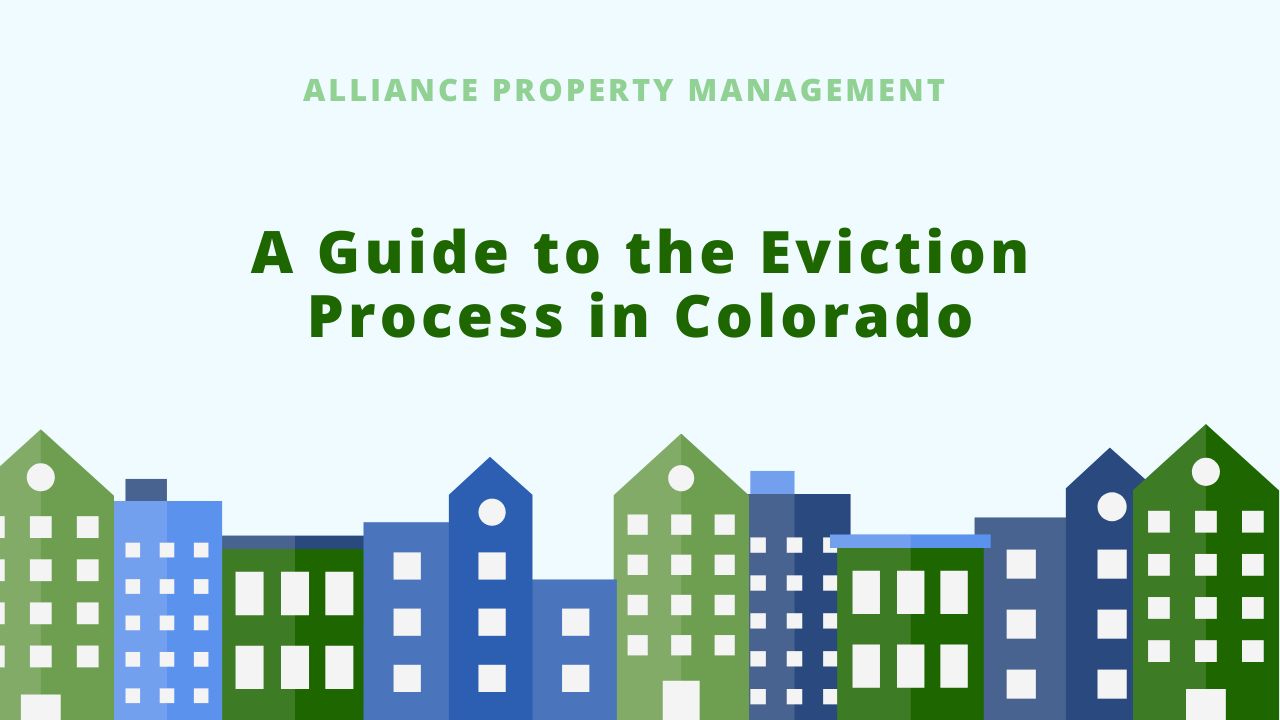As a landlord, do you know how to evict a tenant from your Colorado rental property and end the lease agreement? It's an unfortunate reality that some landlords face when they own rental properties. Evictions can be challenging for a landlord, especially without the proper guidance or knowledge.
That's why it’s essential to familiarize yourself with Colorado eviction law in order to navigate the proper eviction procedure. Furthermore, it will ensure you are legally compliant as a landlord, preventing potential fines or lawsuits that may arise from noncompliance.
In this post, we'll break down the fundamentals of the eviction laws in Colorado for you. With our guidance we can help you to operate within the legal framework, protect you and your tenant‘s rights, mitigate risks, and maintain a positive professional reputation.
An Overview of The Colorado Eviction Process
In Colorado, landlords must follow specific procedures when evicting tenants, including providing notice and obtaining a court order.
Here are the 6 steps a landlord should take when filing an eviction in Colorado:
1. Notify the Tenant
First and foremost, a landlord must properly notify the tenant of their eviction in writing. This notice must specify the type of eviction – whether for failure to pay rent or other breaches of lease terms. Depending on the evictions circumstance, you must allow a certain amount of time for the tenants to remedy the situation to maintain the lease.
2. File a Complaint
If the three days have passed and the tenant has not taken the necessary action, the landlord must file a complaint with the court. This complaint must include the reason for the eviction and any relevant documents or evidence supporting your case.
3. Serve the Eviction Notice
After filing your complaint, you need to serve the eviction notice to the tenant (and any other defendants) with an official copy of the complaint. This must be done in person to those who rent the property.
4. Attend Court
Next, you’ll attend a court hearing before a judge to discuss your case and hear any responses from the tenant. You must prove your claim is valid by providing evidence and facts in court.
5. Writ of Restitution
If the judge rules in your favor, they’ll issue a writ of restitution that mandates that the tenant vacate the premises and end the tenancy.
Once this is issued, you must schedule with the sheriff or other law enforcement officer to escort the tenant off the property if they don’t comply with the order.
6. Possession of Property
After the tenancy ends and the tenant has vacated the premises, you may repossess the property. It’s important to note that, if applicable, you must also properly process any security deposits or other rent fees paid by the tenant under Colorado law.
Types of Notices for Lease Termination With Legal Cause
In Colorado, a landlord may issue a Notice for Lease Termination with Legal Cause to terminate the rental agreement if the tenant has violated some part of their rental agreement.
The most common violations that lead to evictions include if the tenant fails to pay rent, damages the rental property, violates the lease or rental agreement, or engages in illegal activities on the premises. This notice must inform the tenant of their wrongdoings and allow them to remedy the situation.

The Notice to Quit requires a tenant to vacate and evict the property immediately without allowing them to remedy the situation.
This type of notice to quit and notice period can only be used in extreme cases, such as when the tenant engages in criminal activity or if they have caused significant and irreparable damage to the property.
Serving a Tenant With an Eviction Notice
In Colorado, evictions start with serving the tenant with an eviction notice. This notice must be legally delivered to the tenant. According to Colorado Landlord-Tenant Law, an eviction notice can be served in one of four ways:
Give the notice to a family member of the tenant who is at least sixteen years old.
Bring the documents to the tenant's workplace.
Leave the notice in a prominent location on the property if the tenant is unavailable.
Personally deliver the notice to the tenant.
If the tenant doesn’t comply with the notice within the specified period, the landlord must file an eviction lawsuit. The landlord must prove they’ve served the tenant with an eviction notice. This can be a complicated process, and you should expect to pay attorney costs.
Bottom Line
Navigating the eviction process in Colorado can be complex and stressful for landlords. It’s essential to have knowledge of the laws surrounding evictions in the state to legally and successfully evict a tenant.
Alliance Property Management Inc. is not an attorney and does not provide legal advice. Contact us today to learn more about how Alliance PM can help you avoid evictions
Disclaimer: This blog isn’t intended to be a substitute for professional legal advice. Laws change and this information may become obsolete at the time you read it. For further help, please get in touch with a qualified attorney or an experienced property management company.











